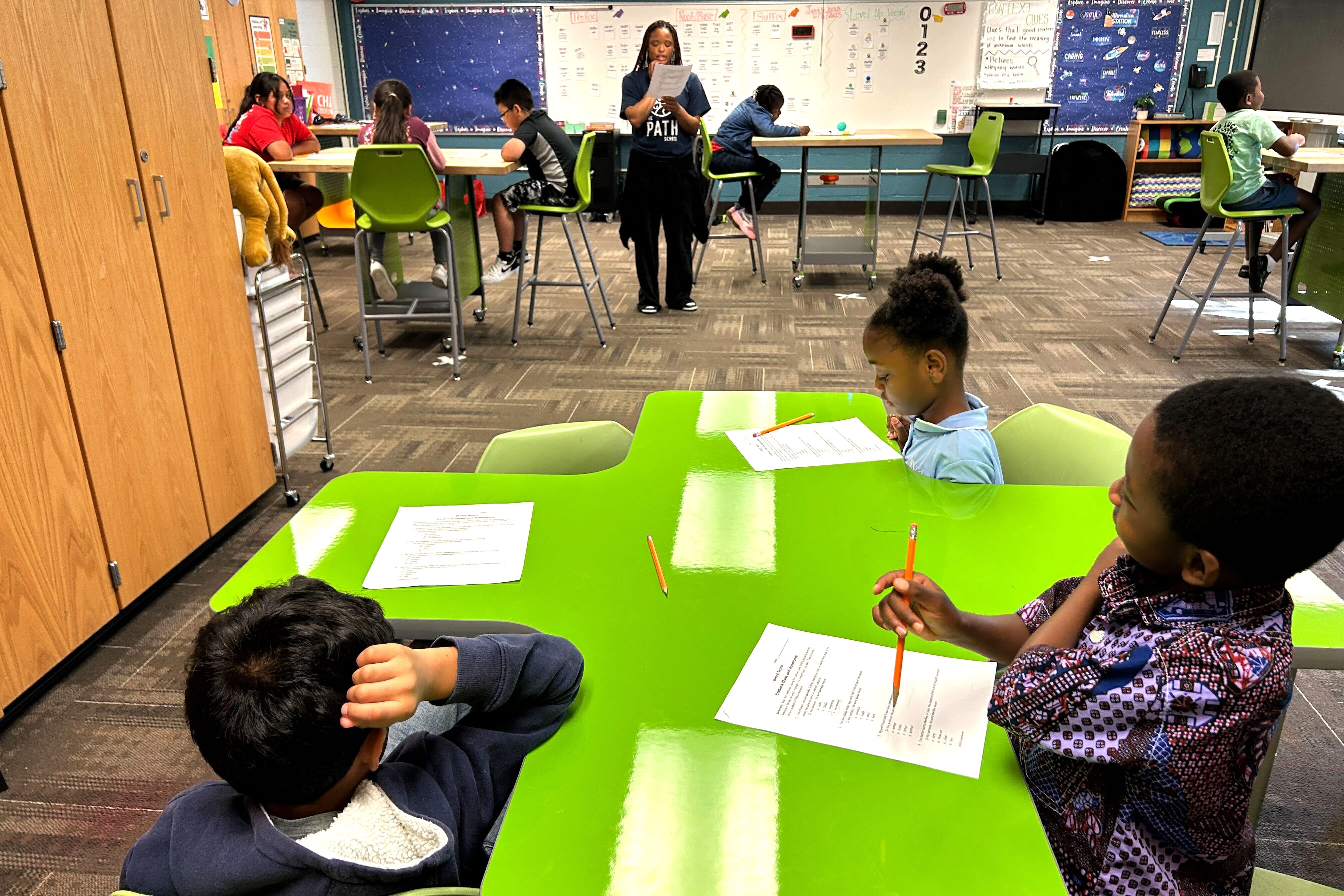Sign up for Chalkbeat Indiana’s free daily newsletter to keep up with Indianapolis Public Schools, Marion County’s township districts, and statewide education news.
All hands were on deck at the PATH School at Stephen Foster School 67 on Monday.
In Destiny Patterson’s room, students used context clues to find out the meaning of the word “pliable.” Down the hall, the definition of “adjective” was on the board as students deconstructed a reading passage.
It was two days before the students began their retake of the state’s third grade literacy exam known as IREAD, and this was the very end of the charter school’s IREAD boot camp. The goal is for students who just finished third and even second grade to pass the test.
The PATH School is one of 55 Indy Summer Learning Lab sites that have enrolled 5,300 Indianapolis students this summer. While the program, which is run by the Mind Trust, focuses on improving students’ math and English skills, they could now play a crucial role for students at risk of being held back based on their literacy skills.
This summer is a critical point for an unknown number of students: a final chance to pass the IREAD in order to avoid repeating third grade.
For many years, Indiana has had a policy on retaining students who do not pass the test — but few students were actually held back thanks to an allowable practice known as “social promotion.” In 2023, over 13,000 students statewide moved on to the fourth grade despite not passing the test, according to Indiana Department of Education data.
Amid concerns about the state’s literacy rates, lawmakers last year mandated retention in law, which makes it more likely that more students will be held back. Those changes take effect for the upcoming school year, though there are still a few exceptions for certain students.
Research suggests that reading by grade 3 is critical to a child’s future academic success.
Still, the retention requirement has garnered concerns from educators, and has reopened a longstanding debate on whether students should be held back.
In even more revisions to the retention law this year, lawmakers allowed students to retake the test twice rather than just once in the summer. The revised law also exempts schools from retaining students until 2027-28 if at least 50% of their third graders are English language learners.
PATH falls under that exemption. But that hasn’t stopped the school from prepping all students for the test. Both third and second grade students who did not pass during the second and third grade are enrolled in the Indy Summer Learning Lab.
“The first core belief of the PATH school is that all scholars can thrive when given the necessary supports to do so,” said Ann Shields, the school’s director of literacy. (PATH is part of the Innovation Network in Indianapolis Public Schools.)
IPS, meanwhile, has summer school sites targeting students who did not pass the IREAD in third grade.
And in Warren Township, the school district has one summer school site for third grade students who did not pass.
“We don’t want to try to communicate the retention piece as a punitive measure, even though it certainly feels that way from a parent’s point of view,” said Associate Superintendent Ryan Russell. “So we try to communicate how critical a student’s ability to be successful on this examination is to their educational outlook.”
Indiana reading retention law does include exemptions
The law’s impact on classrooms will be unclear until after the summer testing window ends Friday. Until then, schools across Indianapolis have been prepping for one final retake.
Schools and districts likely won’t know the total number of students held back until they get IREAD results back around the end of June. IREAD results are typically made public in August.
There are several elements of the law that in theory make it easier for students to avoid being held back.
Schools must give the IREAD test in second grade, and those who pass it are exempt from taking it in third grade. They’re also counted in the following year’s pass rate.
Districts must also offer summer school for third graders who did not pass the IREAD, and to second graders at risk of not passing it. This year, the state budgeted $17.4 million statewide for summer school, with priority given to programs focusing on IREAD.
Students who’ve been English learners for less than two years are exempt from being held back. Those who’ve already been held back or have an intellectual disability or an Individualized Education Program that specifies retention is inappropriate are also exempt. Other exemptions cover those who reached proficiency in math on the state ILEARN exam, and those who have been retained multiple times and have received intensive reading intervention for at least two years.
But educators are particularly concerned about the requirement’s impact on English language learners and have argued that it takes longer than two years to appropriately master English.
In IPS — where nearly one-third of students are English language learners — the district’s IREAD pass rates have dipped from 59.9% in 2021 to 59.8% last year. Since the pandemic, the district has annually promoted upwards of 289 students who did not pass the IREAD and did not receive an exemption to fourth grade, according to state data.
IPS did not respond to requests to visit a summer school site and speak to an official by deadline.
But in April, Chief Learning Officer Lela Simmons told the school board that the district was tracking students who did not pass IREAD to determine areas of improvement.
“This mandate for retention is life-changing for every one of those kids,” she said. “And so we are taking it with that level of seriousness.”
In Warren Township — where IREAD pass rates have increased from 62.7% in 2021 to nearly 82% last year — the district’s work to increase IREAD proficiency has made it “far less anxious” about the number of students facing retention, said Russell.
“But tell that to a family who falls in that category,” he said. “That’s high pressure, high anxiety.”
Summer school attendance can be challenging
In Warren Township, students at Eastridge Elementary rotate between classrooms focused on the three sections of the IREAD test: foundational skills, nonfiction, and literature.
The law requires such summer school programs to be staffed by teachers with training in the science of reading, which the state defines broadly as a body of scientifically based research on literacy instruction. The district has seen scores grow as much as 10% over the summer, according to Russell.

After applying exemptions, Eastridge Elementary Principal Tomeka Johnson estimates retaining only two of the nine students who qualified for summer school this year.
One major challenge of summer school: convincing families to show up. Shorter summer school hours and summer travel can lower attendance.
Students who do show up are on a tight timeline, said Monica Shellhamer, a third grade teacher and second vice president of the Indianapolis Education Association who is teaching at one of the IPS summer school sites.
“We really only have three weeks to make a huge gain for some of our students, and a lot of that’s not realistic,” she said. “Some of them are pretty far off and don’t have an exemption and will be retained based on a multitude of factors.”
At PATH, though, the school has seen good engagement, said Shields. And for second graders, staff have pitched summer school as an opportunity to cross off the IREAD requirement.
“And then once they pass it,” she said, “we tell them they never have to see that test again.”
Amelia Pak-Harvey covers Indianapolis and Lawrence Township schools for Chalkbeat Indiana. Contact Amelia at apak-harvey@chalkbeat.org.





